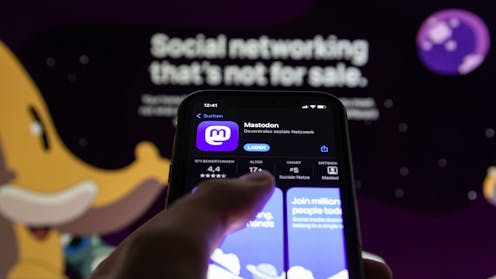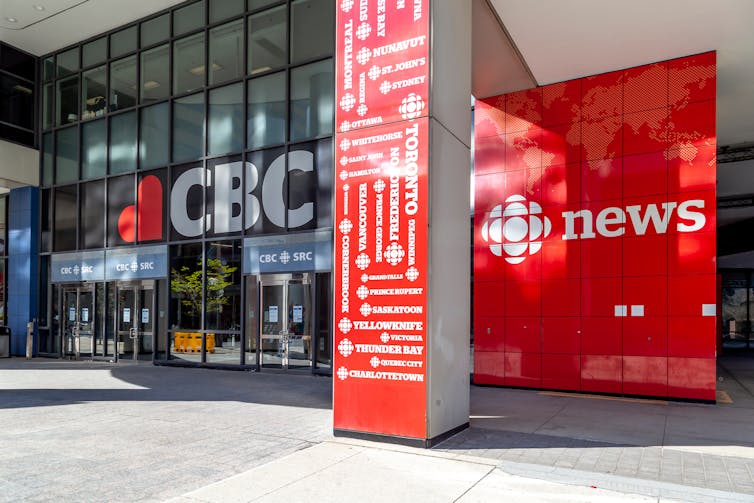
Elon Musk’s acquisition of Twitter and ensuing confusion has driven many to look for alternatives to the platform. One popular option has been Mastodon, a social network distributed on many servers with no central ownership.
Mastodon has seen its profile raised over the past few weeks, and user registration has skyrocketed. Mastodon is not one company, but many federated servers working together. These individual servers need resources. These resources should be public.
As internet communications scholars, we propose that Canada’s public broadcaster, the CBC, should build a Mastodon server on the global network.
CBC starting a Mastodon server could be the start of the news organization seeing itself as not just creating content online, but building better infrastructure for Canadians to create online.
Canadian social media
Mastodon is free and open-source social media software, available to anyone who wants to install it on a computer server. Once installed, a Mastodon server allows people to sign up for accounts and from there do familiar social media activities, such as sharing posts and following others.
What makes Mastodon powerful is that it’s part of a larger network of servers referred to as the fediverse. This network allows one Mastodon server to connect to another — as well as to many other social media software systems. The result is a large, non-centralized network of smaller servers.
À lire aussi : Citizens' social media, like Mastodon, can provide an antidote to propaganda and disinformation
So the CBC could use the Mastodon platform and build its own server to provide access to Canadians who want social media without the reliance upon predominantly American corporations. Ideally, this could be provided globally as an important service in an age when platform interests and national interests have increasingly aligned.
The future of public service media
In the past, the CBC has been a little sensitive about its social media strategy. When former CBC tech columnist Jesse Hirsh called out the public broadcaster for its over-reliance on Facebook, his spot ended.
His comments raise an awkward point: why does a public broadcaster rely so much on privately owned platforms to reach its audience?
The reason is that the work of running a social media service is a challenge for an organization mostly dedicated to content production. But that’s not always been the case.
Historically, Canada’s publicly funded media has many great examples of thinking beyond content production. The National Film Board’s Challenge for Change program sent filmmakers to document the lives of Fogo Island residents. CBC’s ZeD was an experiment in open-source television — the long-forgotten platform allowed Canadians to share their videos online in 2002, three years before YouTube launched.
These media projects were not so much about creating content, but creating the possibilities for what we might call social media today. Running a Mastodon server would do the same.

Re-inventing the future of media
Starting a Mastodon server would also put the CBC on a path to re-invent what social media and online content could look like in the future. This will not be easy, but in our opinion, will raise questions that go along with starting a server and are directly applicable to future social media policy in Canada: sustainability, moderation and trust.
First, we need to consider the sustainability of our internet infrastructure. There is already a green collective on Mastodon trying to run on renewable energy. The CBC relies on Akamai Technologies for its infrastructure. As Akamai commits to lower the carbon footprint of its infrastructure, the same questions apply to the CBC. Could making its Mastodon server help the CBC lower its footprint beyond just media industries?
Second, each server needs to set its own community guidelines that decide its content moderation. The CBC has been quietly working on these issues for years around comments on its website. Starting a Mastodon server would apply the lessons they have learned so far.
Rather than the top-down community values driven by corporate interests, there is an opportunity to align community standards with Canada’s established rights framework and media policy. Starting its own Mastodon service will require the CBC to interpret its own mandate and Canada’s Human Rights Code and Multiculturalism Act before drafting its own community standards for the service.
Third, the CBC would have to contend with fake media, such as deepfakes, foreign propaganda and conspiracy theories.
Strong moderation policies with clear guidelines would be essential. The CBC could bring the power of its fact-checking and verification to social media, tamping down on misinformation. Perhaps the service could even find its own alternative to Twitter’s blue check marks, helping Canadians find information sources they can trust.
Our proposal applies to Radio-Canada as much as the CBC — really, to any public service media. Indeed, we hope that taking alternative social media seriously would reignite a collective and global imagination of the future of public service media.
Fenwick McKelvey has received funding from the Social Science and Humanities Research Council, Les Fonds de recherche du Québec, and the Government of Canada.
Robert W. Gehl ne travaille pas, ne conseille pas, ne possède pas de parts, ne reçoit pas de fonds d'une organisation qui pourrait tirer profit de cet article, et n'a déclaré aucune autre affiliation que son organisme de recherche.
This article was originally published on The Conversation. Read the original article.








